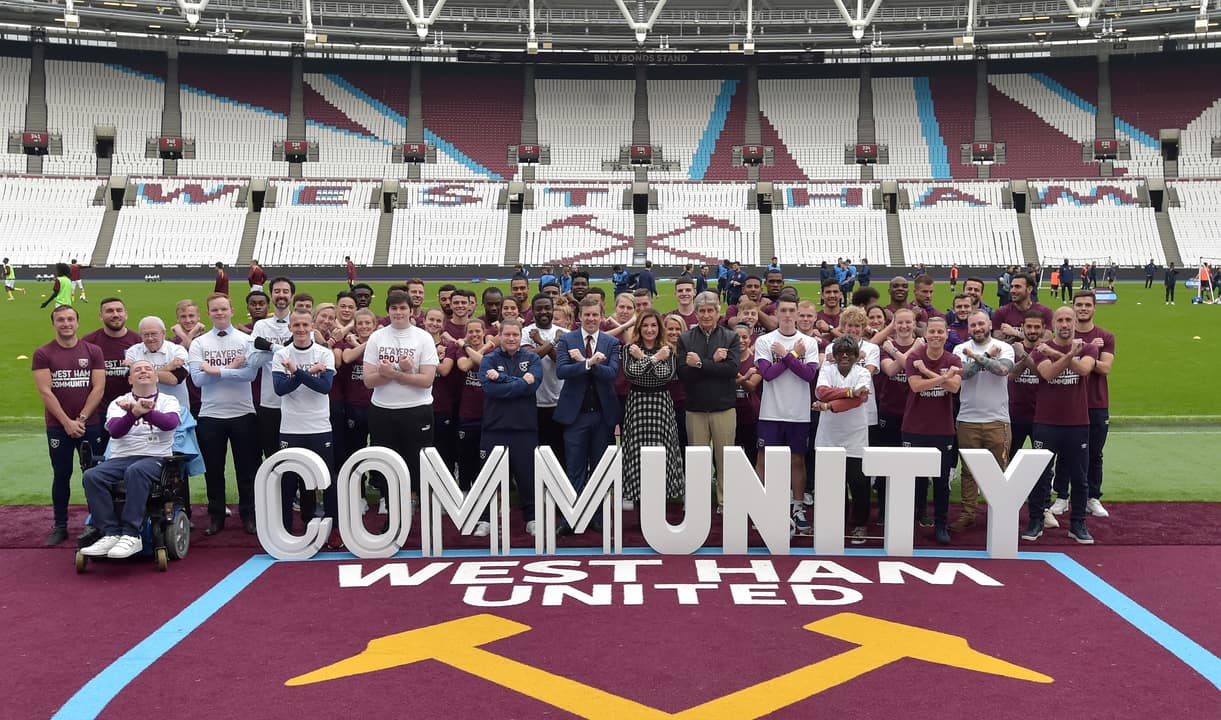West Ham United has today celebrated the one-year anniversary of the Players’ Project.
The Project has been hailed as the most-ambitious community programme ever created by a Premier League Club, where players from the men’s, women’s and Academy teams have given over 300 hours of community time, directly working with over 2,000 people from the local community over this last year alone.
The Players’ Project, split into eleven strands, delivers over 30 programmes that span health, education, community initiatives and football development, which engage with up to 50,000 people per year.
All of the Club’s players, along with the staff supporting them, have passionately bought into these eleven strands. Whether it’s Club Captains Mark Noble’s work with tackling poverty and Gilly Flaherty spending time with the members of the over-65s supporter group, Any Old Irons, to new Club-record signing, Sebastien Haller choosing the Local Enterprise strand.
At the time of the launch of the Project, Baroness Karren Brady committed that West Ham United would invest £10m over three years, in addition to £13m that the Club had invested directly across education, health and social mobility projects since 2013, in the London Borough of Newham and surrounding Olympic boroughs and Essex.

The Club is proud to announce that just one year into the Players’ Project, £5m of this £10m has already been invested in local projects, taking the total to £18m.
Today, West Ham United has committed to increase its commitment over the next two seasons and will invest a further £10m, an increase of £5m on its initial pledge, giving a forecasted investment of £28m by the end of 2021.
Last year, £1.3m was allocated for the benefit of Newham residents and this has directly supported approximately 12,000 people in the borough.
To ensure the continued and tangible impact of the Project, the Club has worked with Switch the Play and EY, with the former conducting first-hand interviews with the players and beneficiaries to get their views and understand how it influences them personally and the latter looking quantitively at the wider economic benefits, with the report listing the Club’s value to the local community.
I am immensely proud of everything we’ve done so far with the Players' Project. It embodies the heart of the communities of London
Baroness Karren Brady
West Ham United Vice-Chairman Baroness Karren Brady said: “One year ago we celebrated the launch of the Players’ Project and I am immensely proud of everything we’ve done so far, and everything we have committed to doing in the future.
“When we moved to the stadium, we came here with the aim of affecting change – bringing investment, making a positive economic impact, creating opportunities for people, for our community. This project has been and continues to be a fantastic achievement, from running days supporting homeless people in the community, to working closely with our fantastic Any Old Irons and Pride of Irons support groups.
“The independent analysis showing, for example, that the Club supports 3,300 local jobs is a significant achievement. However, the investment that has given me the most the pride and satisfaction is not a financial one. It’s a human one. The time, energy and care that our players, staff and volunteers have given to the cause throughout the past year. That is what really makes the difference to those in need. People giving up their time to help, genuinely changing lives for the better.
“West Ham United’s Players’ Project embodies the heart of the communities of London.”
Rob Young, Co-Founder and Director of Switch The Play said: “We’ve worked with the University of Bath and found that the Players’ Project appearances are having an inspirational effect to support behaviour change, in line with the targeted outcomes of the different community groups the Club works with. This means that the players are genuinely inspiring the people they meet, which is really positive.”
Mark Gregory, UK Chief Economist at EY said: “Through the Players’ Project, West Ham United is harnessing the power of elite sport for social good, across one of the most diverse areas in the country, through an enormous breadth of community activity. The Club makes a significant socio-economic contribution to East London, Essex and beyond to a total value of £300m, be it through, for example, £1.4m of annual savings to the NHS delivered through diabetes prevention, the 281 school and educational partnerships or the fact that there have been 50,000 participants in Club Foundation led initiatives per year."